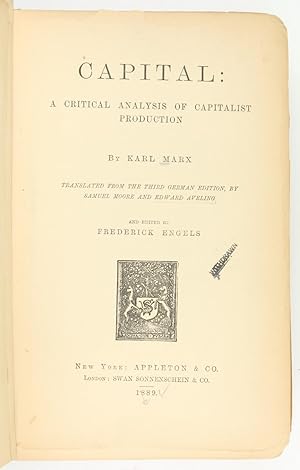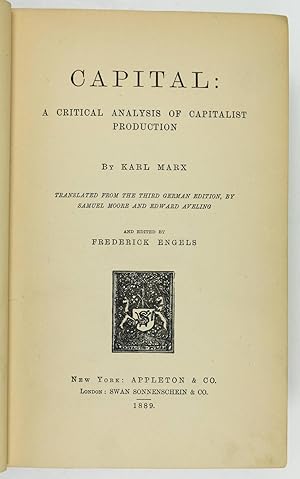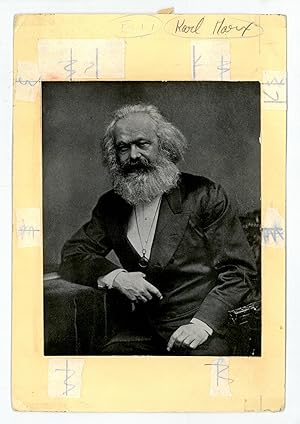karl marx das kapital, Erstausgabe (141 Ergebnisse)
Produktart
- Alle Produktarten
- Bücher (140)
- Magazine & Zeitschriften
- Comics
- Noten
- Kunst, Grafik & Poster
- Fotografien
- Karten
-
Manuskripte &
Papierantiquitäten (1)
Zustand
- Alle
- Neu
- Antiquarisch/Gebraucht
Einband
Weitere Eigenschaften
Gratisversand
Land des Verkäufers
Verkäuferbewertung
-
Das Kapital. Kritik der politischen Ökonomie. Band 1: Der Produktionsprocess des Kapitals.
Verlag: Hamburg., Verlag von Otto Meissner, 1883
Anbieter: Rotes Antiquariat, Berlin, Deutschland
Erstausgabe
XXIII, 808 S. 8°, Halbleinen der Zeit. 3. überarbeitete Auflage des ersten Bandes des ?Kapitals?, die von Friedrich Engels nach dem Tod von Karl Marx herausgegeben wurde. Grundlage war die von Marx noch selber überarbeitete zweite Auflage von 1872 sowie die erste französische Ausgabe von 1875, die die letzte von Marx selber bearbeitete Ausgabe war. In der vierten Ausgabe von 1890 wurden weitere Teile der französischen Ausgabe von Engels eingearbeitet. - Mit privaten Schenkungsvermerk auf dem fliegenden Vorsatzblatt; Bibliotheksstempel sowie Anmerkungen in Tinte auf dem Titelbl. - Einband berieben, an den Kanten bestoßen, Gelenk am Titelblatt gebrochen, dadurch Rücken gelockert, Text in guten Zustand. - 3rd revised edition of the first volume of Capital , edited by Friedrich Engels after the death of Karl Marx. The basis was the second edition of 1872, which Marx himself revised, and the first French edition of 1875, which was the last edition edited by Marx himself. In the fourth edition of 1890 further portions of the French edition were incorporated from Friedrich Engels. - With private donation note on the flyleaf; Library stamp and annotations in ink on title page. - Binding rubbed, bumped at the edges, binding on title page is broken, spine loosened as a result, text in good condition. 2000 gr.
-
Das Kapital. Kritik der politischen Oekonomie. Vols. 1 and 2 (of 3).
Verlag: Hamburg, Otto Meissner, 1885-1890., 1890
Anbieter: Antiquariat INLIBRIS Gilhofer Nfg. GmbH, Vienna, A, Österreich
Erstausgabe
8vo. 2 vols. XXXII, 739, (1) pp. XXVII, (1), 526 pp. Contemporary half calf with remains of gilt spine. Fourth edition of vol. 1 (Der Produktionsprocess des Kapitals); first edition of vol. 2 (Der Cirkulationsprocess des Kapitals), edited by Friedrich Engels. - Handwritten ownership of "Dr. Sienz" (ca 1919) on title of vol. 1; includes postcard by Th. Döring to Dr. Hans Sienz in Nuremberg (dated 8 Sept. 1919). Both spines professionally repaired (using original material in the spine of vol. 1), otherwise a well-preserved set of the first two volumes (the third volume would not appear until 1894). - Marx/Engels Erstdrucke 32. Rubel 633 (note). Stammhammer I, 145, 7.
-
Kapital'. Kritika Politicheskoi Ekonomii.
Verlag: St. Petersburg, N. P. Poliakov, 1872., 1872
Anbieter: Antiquariat INLIBRIS Gilhofer Nfg. GmbH, Vienna, A, Österreich
Erstausgabe
8vo. (2), XIII, (2), 678 pp. Contemporary half calf with gilt title to spine. In custom-made green morocco-backed clamshell case. First edition in Russian, the first translation of "Das Kapital" into any language. Due to the unexpected popularity of the book, and its subsequent ban in the 1890s, this edition of 3000 copies was soon exhausted and the book became very rare. Later, Marx noted the excellence of the Russian translation. In 1880, he wrote to F. Zorge saying that of all countries, the "Capital" had been read and appreciated most fully in Russia. - Marx-Engels Erstdrucke 33.
-
Das Kapital. Kritik der politischen Oekonomie. Erster Band. Buch I. Der Produktionsprocess des Kapitals.
Verlag: Hamburg, Otto Meissner, 1867., 1867
Anbieter: Antiquariat INLIBRIS Gilhofer Nfg. GmbH, Vienna, A, Österreich
Erstausgabe
8vo. XII, 784 pp. Slightly later half cloth with marbled covers. Stored in custom-made cloth case with gilt spine label. First edition: a fine copy of one of the most influential books ever published. The exceedingly rare first volume was the only one to be completed by Marx in his lifetime, while the second and third volumes were completed posthumously by Engels from Marx's papers (1885 and 1894). "The history of the twentieth century is Marx's legacy [.] Within one hundred years of his death half the world's population was ruled by governments that professed Marxism to be their guiding faith. His ideas have transformed the study of economics, history, geography, sociology, and literature" (Wheen). "Marx himself modestly described 'Das Kapital' as a continuation of his 'Zur Kritik der politischen Oekonomie', 1859. It was in fact the summation of a quarter of a century's economic studies, mostly in the Reading Room of the British Museum" (PMM). - Stamp of the Würzburg Volksbildungsverein on title page (slightly trimmed at bottom during rebinding ca. 1900). Occasional slight staining to edges near beginning, not touching text; a few pencil annotations by an economic scholar, ca. 1900. Altogether a tight, well-preserved specimen. - PMM 359. Rubel 633. Wheen, Marx, p. 299 ff. Books That Made Europe, p. 238.
-
Das Kapital. Kritik der politischen Oekonomie. Erster Band. Buch I: Der Produktionsprozess des Kapitals. Zweite verbesserte Auflage.
Verlag: Hamburg, Verlag von Otto Meissner, 1872., 1872
Anbieter: Antiquariat Hohmann, Schemmerhofen, Deutschland
Erstausgabe
Tit., 830 S., etw. spät. HLn., vord. Rckn.Gel. alt rest., NaV., tls. Anstr., tls. etw. stockfl. -- Ausgabe letzter Hand. - Mit Beigabe:- [ Wirtschaftswissenschaft Sozialismus J| 1872 N| Karl Marx ] --.
-
Das Kapital. Kritik der politischen Oekonomie. Zweiter Band. Buch II: Der Cirkulationsprocess des Kapitals. Herausgeben von Friedrich Engels.
Verlag: Hamburg: Otto Meissner, 1885, 1885
Anbieter: Peter Harrington. ABA/ ILAB., London, Vereinigtes Königreich
Erstausgabe
First edition of the second volume of Das Kapital. Only the first volume of Das Kapital was published in Marx's lifetime, in 1867. Following Marx's death in 1883, the second and third volumes were edited from Marx's manuscripts and seen through the press by Friedrich Engels, with the present second volume published in 1885, and the third volume in 1894. Together they form the most significant and influential critique of capitalism ever published, with Das Kapital becoming the bible of Marxist movements and governments in the following century. "The history of the twentieth century is Marx's legacy. Stalin, Mao, Che, Castro - the icons and monsters of the modern age have all presented themselves as his heirs. Whether he would recognise them as such is quite another matter. Nevertheless, within one hundred years of his death half the world's population was ruled by governments that professed Marxism to be their guiding faith. His ideas have transformed the study of economics, history, geography, sociology and literature. Not since Jesus Christ has an obscure pauper inspired such global devotion - or been so calamitously misinterpreted" (Francis Wheen, in his introduction to Karl Marx, 1999). Einaudi 3772; Mattioli 2284; Rubel 635; Sraffa 3867. Octavo (219 x 139 mm). Twentieth century blue cloth, spine lettered in gilt, red speckled edges. Binding rubbed, stamp of "The Adam Smith Class Library" on p. iii and 25, some leaves unopened, stain at fore edge encroaching into margin but not into text, 4 cm closed tear to pp. 301/2 just impinging on text and at head of 409-12 not affecting text, terminal imprint leaf chipped round extremities. A good copy.
-
Berlin, Franz Duncker, 1859. 8vo. Nice contemporary hafl calf with gilt lettering to spine. A bit of wear to extremities, markings after old label to front board and signs of vague damp staining to front board. A mostly faint damp stain to outer inner corner throrughout, but otherwise very nice. Title-page a bit dusty. Old library number (872) to front free end-paper and top of title-page and marginal pencil-annotations to a number of leaves. VIII, (2), 170 pp. Title-page with the ownership-signature of Alexander Appolonovich Manuilov to top of title-page and binding with his initials "A. M." in gold to the fot of spine. Scarce first edition, in a magnificent association-copy, of the groundbreaking work, in which Marx first presents his revolutionizing theories of capitalism, forming the foundation for his main work "The Capital", which appeared eight year later. It is also in this milestone of political and economic thought that Marx presents his economic interpretation of history for the first time.Alexander Appolonovich Manuilov (1861-1929) was a Russian economist and politician, famous not only as one of the founding members of the Constitutional Democratic party (known as the Kadets), but also as the Russian translator of Marx' "Zur Kritik.", i.e. the present work. "Manuilov graduated from the law department of the University of Novorossiia (Odessa, 1883). He began scholarly and pedagogical work in political economy in 1888. In 1901 he became head of a subdepartment at Moscow University, becoming assistant rector in 1905 and serving as rector from 1908 to 1911. He was dismissed by the tsarist government for attacking the "extremes" of Stolypin?s agrarian legislation. In the 1890?s he was a liberal Narodnik (Populist), later becoming a Constitutional Democrat (Cadet) and a member of the Central Committee of the Cadet Party. Manuilov?s draft on agrarian reform (1905) was the basis for the Cadets? agrarian program. V. I. Lenin sharply criticized Manuilov, calling him one of "the bourgeois liberal friends of the muzhik who desire the ?extension of peasant land ownership? but do not wish to offend the landlords" (Poln. sobr. soch., 5th ed., vol. 11, p. 126, note).At the beginning of his scholarly career Manuilov accepted the labor theory of value. In 1896 he translated K. Marx? work A Contribution to the Criticism of Political Economy (Zur Kritik der Politischen Oekonomie). During the years of reaction he espoused subjectivist and psychological views in political economy. In 1917 he was minister of education of the Provisional Government. After the October Revolution in 1917 he emigrated but soon returned and cooperated with Soviet power. He participated in the orthographic reform (1918). In 1924 he became a member of the board of Gosbank (State Bank). He taught in higher educational institutions. Changing to Marxist positions and relying on Lenin?s works, he criticized the revisionists and neo-Narodniks on the agrarian question." (Encycl. Britt.).For many years, the exclusive focus on "Das Kapital" meant that the "Kritik" was overlooked. Since the beginning of the 1960's, however, scholars have become increasingly aware of its importance as the blueprint for the social and economic theory Marx shall go on to develop (see for example Raymond Aron, "Le Marxisme de Marx", 1962). It is here that Marx outlines the research programme to which he shall devote the rest of his working life. He himself described "Das Kapital" as a continuation of his "Zur Kritik der politischen Oekonomie" (see e.g. PMM 359), in which his primary concern is an examination of capital and in which he provides the theoretical foundation for his political conclusions later presented in "Das Kapital". "I examine the system of bourgeois economy in the following order: capital, landed property, wage-labour" the State, foreign trade, world market.The economic conditions of existence of the three great classes into which modern bourgeois society is divided are analysed under the first three headings the interconnection of the other three headings is self-evident. The first part of the first book, dealing with Capital, comprises the following chapters: 1. The commodity, 2. Money or simple circulation" 3. Capital in general. The present part consists of the first two chapters." (Preface to the present work, in the translation (by S.W. Ryazanskaya) of the Progress Publishers-edition, Moscow, 1977).Apart from the obvious importance of the work as the foundational precursor to what is probably the greatest revolutionary work of the nineteenth century, the "Kritik" is of the utmost importance in the history of political and economic thought, as it is here, in the preface, that Marx outlines his classic formulation of historical materialism. This preface contains the first connected account of what constitutes one of Marx's most important and influential theories, namely the economic interpretation of history - the idea that economic factors condition the politics and ideologies that are possible in a society."The first work which I undertook to dispel the doubts assailing me was a critical re-examination of the Hegelian philosophy of law" the introduction to this work being published in the Deutsch-Franzosische Jahrbucher issued in Paris in 1844. My inquiry led me to the conclusion that neither legal relations nor political forms could be comprehended whether by themselves or on the basis of a so-called general development of the human mind, but that on the contrary they originate in the material conditions of life, the totality of which Hegel, following the example of English and French thinkers of the eighteenth century, embraces within the term "civil society"" that the anatomy of this civil society, however, has to be sought in political economy. The study of this, which I began in Paris, I continued in Brussels, where I moved owing to an expulsion order issued by M. Guizot. The general conclusion at which I arrived and whic.
-
Hamburg, Otto Meisner, 1867. 8vo. Nice contemporary black half calf with gilt spine. Minor wear to hinges and capitals, which have tiny, barely noticeable professional restorations. Inner hinges re-enforced. Contemporary owner's names (Emil Kirchner and Karl Kirchner (1887)) to front free end-paper. Contemporary book-plate to inside of front board (Ernst Ferdinand Kirchner). A very nice copy with just the slightest of occasional brownspotting. Housed in a very nice custom-made black full morocco box with gilt llettering to spine. XII, 784 pp. Scarce first edition of Marx' immensely influential main work, arguably the greatest revolutionary work of the nineteenth century. With its attack on capitalists and capitalist mode of production, this cornerstone of 19th century thought came to determine the trajectory of economics and politics of the Western world. Marx' groundbreaking "Das Kapital" originally appeared in German in 1867, and only the first part of the work appeared in Marx' lifetime. PMM 358.
-
Kapital. Krytyka ekonomii politycznej. Tom pierwszy.
Verlag: Lipsk (Leipzig), E. L. Kasprowicz, 1884[-1889]., 1889
Anbieter: Antiquariat INLIBRIS Gilhofer Nfg. GmbH, Vienna, A, Österreich
Erstausgabe
Tall 4to (186 x 276 mm). VII, (1), 325, (1) pp. Modern marbled half calf with giltstamped title to spine. Marbled endpapers. Very rare first Polish edition of "Das Kapital": the first Polish translation of Marx's revolutionary magnum opus, clandestinely printed in Germany (by Gustaf Uszman in Weimar) and then smuggled into Poland. The publication of the first Polish translation not only came to influence Polish politics and economics, but also marked an important watershed in Polish socialism and constitutes one of the earliest printings within organized Polish Marxism. - A few edge tears to the title-page professionally repaired; old Polish library stamps (deaccessioned) on verso. Only two copies recorded in libraries via OCLC: in the National Library of Poland (Biblioteka Narodowa) in Warsaw and at the International Institute of Social History in Amsterdam. - Estreicher (1881-1900) III, 130. OCLC 750556887. Not in Marx-Engels Erstdrucke. Cf. PMM 359.
-
Karl Marx "Das Kapital", Erbe und Verpflichtung. Beiträge zum 100. Jahrestag der Erstausgabe des Werkes "Das Kapital" von Karl Marx. Im Auftrag der Karl-Marx- Universität hrsg. von A. Heinze und S.I. Tjulpanow.
Verlag: Leipzig., 1968
Anbieter: Antiquariat Jürgen Lässig, Berlin, Deutschland
Erstausgabe
Gr.8°. VIII, 716 S. mit Abb. Original-Leinenband. Erste Ausgabe. >Gewicht über 1 Kg - Versand in DE 6,50 / EU 13,00 / International 18,00 <.
-
Das Kapital. A Collection Containing 4 First Editions of Karl Marx's Das Kapital (Bulgarian, Serbian, Serbo-Croatian, and Hebrew) [WITH] The Second Polish Edition
Erscheinungsdatum: 1954
Anbieter: ERIC CHAIM KLINE, BOOKSELLER (ABAA ILAB), Santa Monica, CA, USA
Erstausgabe
First & Second editions. 1) Dimitar Blagoev (trans.). Ð Ð°Ð¿Ð Ñ Ð°Ð»Ñ Ñ Ñ : Ð Ñ Ð Ñ Ð ÐºÐ° на Ð Ð¾Ð»Ð Ñ Ð Ñ ÐµÑ ÐºÐ°Ñ Ð° Ð ÐºÐ¾Ð½Ð¾Ð¼Ð Ñ . Ð¢Ð¾Ð¼Ñ Ð Ñ Ñ Ð Ð / KapitalÅt: Kritika na Politicheskata Ekonomiya. TomÅ PÅrvi (Capital: A Critique of Political Economy. Vol.1) [FIRST BULGARIAN EDITION]. Ð¡Ð¾Ñ Ð Ñ [Sofia]. Ð Ð°Ñ Ñ Ð Ð Ð½Ð°Ñ Ð° Ð¡Ð¾Ñ Ð Ð°Ð»Ð Ñ Ñ Ð Ñ ÐµÑ ÐºÐ° Ð Ð½Ð Ð Ð°Ñ Ð½Ð Ñ Ð° Ð Ð ÐµÑ Ð°Ñ Ð½Ð Ñ Ð° [The Party Socialist Bookstore and Printing House]. [ca. 1909]. First Bulgarian edition. Small quarto. 675pp. [1]. Period red buckram boards with gilt lettering, ruling and tooling on the front cover and spine. Decorative endpapers. The extremely scarce first Bulgarian edition of the first part of Karl Marx's seminal work Capital (Das Kapital), originally published in German in 1867. Eventually the work comprised three volumes, with the second and third parts published after Marx's death by his colleague Friedrich Engels. This edition was published by the bookstore of the Bulgarian Social Democratic Workers' Party (later the Bulgarian Communist Party) who's founder, leading Balkan Marxist Dimitar Blagoev (1856-1924), translated this edition. In 1905 Blagoev published a scarce partial translation of the work, but it wasn't until 4 year later that this full translation was released to the Bulgarian public. The date of August 1909 is given at the end of Blagoev's introduction, although the title page does not list a publication date. There is some debate as to weather this, or another edition translated by Bulgarian writer, historian and socialist Georgi Bakalov (1873-1939), with a title page listing the publication date as 1910, should be considered the first Bulgarian edition. However, given the earlier 1909 date in this introduction, and the fact that Blagoev was already translating the work four years earlier, suggests that this translation probably supersedes the other. As stated in this edition, this edition was based on the 1906 Russian edition. The text throughout contains copious scholarly footnotes. The front of the book contains a detailed table of contents and a page containing a small b/w photographic reproduction after a portrait of Karl Marx, immediately following the title page. It is believed that ultimately only the first volume of Das Kapital was translated by Blagoev, and not the others. Text in Bulgarian, in Cyrillic script. Binding with some rubbing and bumping to extremities, including the head and tail of the spine. Some light smudges, scratches and stains to the covers and spine, with gilt a bit rubbed. Interior with some sporadic light marginal notes and/or underlining in regular and red colored pencil to few pages throughout the text, as well as some sporadic minor smudges. Book block quite tight overall. Binding in good, interior in very good- condition overall. Extremely scarce. g to vg-. Hardcover. * Only one confirmed copy of this full translation in OCLC. 2) PorobiÄ , M. (MoÅ¡a Pijade) and R. Bosanac (Rodoljub Ä olakoviÄ ) (translators); Svetomir Lazarevic (ed.). Kapital. Kritika PolitiÄ ke Ekonomije. Proces Proizvodnje Kapitala [WITH] Prometni Proces Kapitala [SCARCE FIRST COMPLETE SERBO-CROATIAN TRANSLATION, BOTH THE FIRST AND SECOND VOLUMES]. Belgrade. Kosmos. 1933-1934. First Serbo-Croatian edition. Quarto. Vol.1: 837pp. [2]. Vol.2: 549pp. [2]. Blue-grey cloth boards with gilt and black lettering on the front covers and spines. A complete set of both the first and second volumes of Karl Marx's magnum opus "Kapital", here fully translated into Serbo-Croatian for the first time. Among the notable aspects of the these volumes is that the translation was done in collaboration between two major Communist political and cultural figures in Yugoslavian history, Marxist theorist MoÅ¡a Pijade (1890-1957) and writer and political activist Rodoljub Ä olakoviÄ (1900-1983), while serving in prison together as political dissidents. The second volume was translated by Pijade alone. Both men were seen as influential Yugoslavian Marxist figures, and both played prominent roles in the Yugoslav Partisan resistance to the Axis-powers' occupation during WWII. After the war and the reestablishment of Yugoslav governance, Pijade became a significant figure in politics and government and a close confidant of Yugoslav leader Josip Broz Tito, while Ä olakoviÄ became a prolific writer. These volumes were published by Kosmos, as the third and six parts (respectively) of their series of philosophical publications, and were the sole volumes to been printed with text in Roman script until 1940. At the time of publication, both MoÅ¡a Pijade and Rodoljub Ä olakoviÄ were still imprisoned, and so were credited under the pseudonyms of M. PorobiÄ and R. Bosanac respectively. The final pages of each volume contain an index, a table of contents and publisher's advertisements. Text throughout in Serbo-Croatian, in Roman script. Bindings with some bumping to corners and some minor to moderate rubbing to extremities, as well as some minor to light rubbing to the gilt. Vol.1 with some rubbing and tearing at the tail of the spine along the front hinge, as well as a few small abrasions to the back cover. Vol.1 with starting at the interior covers. Vol. 2 with starting at the interior front cover and p.550, and a signed inscription to the previous owner on the front free endpaper. Pages throughout both volumes with some minor to light age toning along the edges, as well as some very sporadic minor to light water stains, smudges and/or underlining in pencil. Bindings in good to very good- condition. Interior in good+ to very good- condition overall. Quite scarce. g to vg-. Hardcover. * The previously issued 1924 Serbian edition of Kapital was issued in Belgrade and was a translation of the widely and internationally circulated digest of the work done by Julian Borchardt (1868-1932). This 1933-1934 edition contains the first complete translation done by MoÅ¡a Pijade, and was seen as among a number of reasons for his arr.
-
Das Kapital. Kritik der politischen Ökonomie. Im Zusammenhang ausgewählt und eingeleitet von Benedikt Kautsky. Erstes Buch: Der Produktionsprozess des Kapitals. Zweites Buch: Der Zirkulationsprozess des Kapitals . Drittes Buch: Der Gesamtprozess der kapitalistischen Produktion. (= Kröners Taschenausgabe. Bände 64 und 65).
Verlag: Stuttgart, Kröner, 1929
Anbieter: Chiemgauer Internet Antiquariat GbR, Altenmarkt, BAY, Deutschland
Buch Erstausgabe
Originalleinen. 18 cm. Zustand: Gut. ERSTAUSGABE dieser Ausgabe. Kl.-8°. XLV, 398 Seiten, 8 Blatt (Verlagsanzeigen) u. IX, 356 Seiten., 8 Blatt (Verlagsanzeigen). Einbände mit nur ganz leichten Gebrauchsspuren. Kleiner Name am oberen Rand des Innendeckels, auf dem Innendeckel und Vorsatz des ersten Bandes zahlreiche Bleistiftnotizen zum Titel, sonst GUTES Exemplar der ZWEI Bände ( vollständig) Mit ausführlicher EINLEITUNG von KAUTSKY. Sprache: Deutsch Gewicht in Gramm: 400.
-
Najamni Rad I Kapital. S uvodom fridriha Engelsa
Erscheinungsdatum: 1907
Anbieter: Maggs Bros. Ltd ABA, ILAB, PBFA, BA, London, Vereinigtes Königreich
Erstausgabe
First edition in Serbian. 8vo. 53, [3] pp. Original printed wrappers, edges untrimmed (some neat restoration work to the spine, ownership inscription dated 1920 to head of title, otherwise a very good copy indeed). Beograd, Izdanje Srpske Socijal-Demokratske Stranke. The first Serbian translation of Marx's essay Wage Labour & Capital, an important precursor to his critique of political economy in Das Kapital, originally delivered as a series of lectures at the German Workingmen?s Club of Brussels in 1847 and first published as a series of articles in the Neue Rheinische Zeitung in 1849. Also included is a translation of the ten page introduction to the text by Friedrich Engels prepared for the German edition of 1891. The translation was undertaken by Dimitrije Tucoviç (1881-1914), the founder of modern trade unionism in Serbia, and published by the Serbian Social Democratic Party (SSDP, Srpska socijaldemokratska partija). It was published in the SSDP's influential book series 'Socijalisticka Biblioteka', which played a key role in the diffusion of Marxist texts in the Kingdom of Serbia prior to the First World War and the subsequent formation of the Kingdom of Yugoslavia. Dimitrije Tucoviç was a founding member of the SSDP in 1903 and lead the party from 1908 until his death in 1914. Under his direction the SSDP became one of the most progressive and revolutionary workers? parties in Europe, prioritising the full establishment of universal suffrage and promoting the development of trade unionism in Serbia. Tucoviç was also an influential socialist writer in his own right, his most important contribution to Marxist discourse being the book Serbia and Albania (1914), a critique of the imperialist policy of the Kingdom of Serbia in the Balkans, as well as a prolific translator of Marxist texts, producing a Serbian translation of the Communist Manifesto published in the same year as the present edition of Wage Labour & Capital. Tucoviç is perhaps best remembered for his commitment to the anti-war movement, vehemently opposing the bourgeoise interests behind the Serbian invasion of Albania in 1912 and the eventual outbreak of the First World War. Indeed, under his leadership the SSDP were one of only three members of the Second International to oppose the First World War, along with Lenin's Bolsheviks and the 'Narrows' of Bulgarian Workers' Social Democratic Party lead by Dimitar Blagoev. Nevertheless, despite his anti-war principles, he was drafted into the Serbian army as a reserve officer upon the outbreak First Balkan War and was killed in 1914 at the Battle of Kolubara against the Austro-Hungarian Empire. Tucoviç was well-known amongst European revolutionary circles and was eulogised upon his death by Leon Trotsky in an article published in the newspaper Kievskaya Mysl as ?one of the noblest and most heroic figures of the Serbian workers? movement? Rare. We have been unable to trace any copies held institutionally outside of Serbia. No copies on OCLC or KVK.
-
København, (Copenhagen), 1885-87. 4to. In contemporary half cloth with gilt lettering to spine. Even browning as usual, due to the paper quality. An envelope pasted on to front free end-paper containing Danish articles on Marx. Previous owner's name to title-pages. A fine and clean copy with both half-titles present ("Socialistisk Bibliotek" Vol. IV-V). Vol 1: (2), 473, (1)" Vol 2: VII-1" (4), 363, (1) pp. First edition of the first Danish translation of "Das Kapital". The translation is remarkable in several respects - the Danish Social-democratic party was one of the first labour organizations in the world to publish the two volumes of "The Capital", the translation of the first volume preceded both the English and the Italian, and the translation of the second volume is the second in the world to appear, only preceded by the Russian from 1885 - furthermore, these two translations were the only two to appear of volume two until after Engels' death in 1895. After having been in a serious crisis at the end of the 1870'ies, the labour movement in Denmark turned things around in the 1880'ies, primarily with the aid of Marx. Marx' theories and his connection between theoretical and practical politics became the foundation for the Social Democrats. In 1884, the Danish Social Democratic Party got its two first members of parliament elected, and many workers wished to become politically active. Also in Denmark, the class struggle had properly begun.As Marx was the foundation for the beginning success of the Social Democrats, the Party decided that it would translate and publish all the most important works by Marx - of course most importantly "The Capital". This translation was to become "a new and powerful weapon for the Danish Labour Party in the agitation for the socialist principles". The translation of "The Capital" was made by the linguist and journalist Hans Vilhelm Lund (1840-1893), who worked at the paper Social-Demokraten in the 1880'ies and 90'ies. The translation is famed for being extremely true to the original and virtually flawless. In order to reach as wide a relevant audience as possible, the price was kept as low as it could be. It still constituted a full day's wages for a skilled worker, namely 2 kroner - still about 1/7 of the German edition. In spite of all the efforts to distribute the translation, it did not become a bestseller, and in 1911, the remainders were issued with a new title-page in 1911. (PMM 359 - first edition).
-
Das Kapital. Kritik der politischen Oekonomie. Buch I: Der Produktionsprocess des Kapitals. Zweite verbesserte Auflage; [together with:] Buch II: Der Cirkulationsprocess des Kapitals. Herausgeben von Friedrich Engels; [and:] Buch III: Der Gesammtprocess der kapitalistischen Produktion.
Verlag: Hamburg: Otto Meissner, 1872; 1885; 1894, 1894
Anbieter: Peter Harrington. ABA/ ILAB., London, Vereinigtes Königreich
Erstausgabe
First editions of volumes II and III, revised second edition of volume I, forming a complete set of Das Kapital, Marx's polemical masterpiece, the culmination of nearly 25 years of research. The most significant and influential analysis of capitalism ever written, Das Kapital became the bible of Marxist movements and governments. The first edition of the first volume was published in 1867. Marx revised the text for the present second edition of 1872, and contributed a new ten-page afterword. Following Marx's death in 1883, the second and third volumes were edited from Marx's manuscripts and seen through the press by Friedrich Engels - the second volume published in 1885, and the third volume (in 2 parts) in 1894. "The history of the twentieth century is Marx's legacy. Stalin, Mao, Che, Castro - the icons and monsters of the modern age have all presented themselves as his heirs. Whether he would recognise them as such is quite another matter. Nevertheless, within one hundred years of his death half the world's population was ruled by governments that professed Marxism to be their guiding faith. His ideas have transformed the study of economics, history, geography, sociology and literature. Not since Jesus Christ has an obscure pauper inspired such global devotion - or been so calamitously misinterpreted." (Francis Wheen, in his introduction to Karl Marx, 1999). Rubel 633, 635, 636. 3 volumes bound in 4, octavo. Buch I: 210 x 208 mm, contemporary black half cloth, rebacked with original spine laid down, preserving contemporary paper label (chipped with loss), marbled paper sides. Buch II: 207 x 136 mm, near-contemporary black quarter morocco-grain roan, spine lettered in gilt, marbled paper sides. Buch III (in 2 vols.): 216 x 135 mm), contemporary brown half morocco, orange and black labels, marbled sides and endpapers. Buch II bound without the terminal imprint leaf, and pp. 155/6 in cancelled state. Light rubbing, some light browning and foxing to contents as usual. Buch I with errata bound at front (with paper repair in gutter, and to facing dedication leaf). Buch II with ownership blindstamp to title with 2 small patches of loss, small chip to fore margin of pp. 271/2. Buch III with contemporary label of "Lewald Karlsruhe" to front pastedowns. A very good set.
-
120 Jahre "Das Kapital" von Karl Marx und der Staatsmonopolistische Kapitalismus heute
Verlag: Edition Marxistische Blätter, Düsseldorf, 1988
ISBN 10: 3885010925ISBN 13: 9783885010920
Anbieter: Der Ziegelbrenner - Medienversand, Bremen, Deutschland
Buch Erstausgabe
EA. Einband etwas berieben, sonst sehr guter Zustand, 62 S., kart. Herausgegeben zum Symposium am 5. April 1987 in Wuppertal. Schriften der Marx-Engels-Stiftung Band 9 Gramm 600.
-
Kapital. Kritika Politicke Ekonomije od Karla Marksa. Popularno Izdanje. Priredio Julian Borhart
Erscheinungsdatum: 1924
Anbieter: Maggs Bros. Ltd ABA, ILAB, PBFA, BA, London, Vereinigtes Königreich
Erstausgabe
First edition in Serbian. 8vo. 198, [4] pp. Original purple printed wrappers, edges untrimmed (early ownership inscription in red ink to title page and page 57, 4.7cm portion to head of title page re-margined with no loss of text, think strip of paper reinforcement to top edge of second to last leaf, final leaf reinforced with paper backing obscuring the terminal blank; rebacked with the original spine laid down, some sympathetic paper reinforcement to extremities of front and rear covers). Beograd, Izdavacka Knjizarnica Gece Kona. An important precursor to the first full-length Serbian translation of Das Kapital, often mistakenly referred to as the first full Serbian translation of the first volume, but in fact a translation of Julian Borchardt?s ?Gemeinverständliche Ausgabe? or ?Popular Edition? Originally published in Berlin in 1919, Borchardt?s ?Popular Edition? was a collection of excerpts from all three volumes of Kapital, with a preface by Borchardt, but no further explanatory notes. The translation was undertaken by the Serbian and Yugoslav communist Mo?a Pijade (1890-1957), the foremost Marxist theoretician of the Communist Party of Yugoslavia (KPJ, Komunisticka partija Jugoslavije) and one of the closest collaborators of the Yugoslav communist leader Josip Broz Tito. Born to a well-known Sephardic Jewish family in Belgrade, Pijade was a leading figure in post-war Communist Yugoslavia and played an important role in the Tito?Stalin split of 1948, but also contributed to the dissemination of Marxist thought during the interwar years in the ?first? Yugoslavia through his work translating and publishing Marxist material. The KPJ was outlawed in 1921 and in 1925, the year after the publication of the present translation, Pijade was sentenced to fourteen years in prison for his revolutionary activities and for illegally editing and printing a Communist newspaper. Pijade was transferred to the notorious Lepoglava prison in 1930, where he became Tito?s cellmate, tutoring his junior revolutionary in Marxist orthodoxy. Various earlier attempts to translate Marx?s great work into Serbian had made, including the publication of several short excerpts printed in newspapers and other periodicals in 1872, 1877, and 1888 respectively. The first book-length attempt appeared in Geneva in 1900, a translation of the famous Gabriel Deville abridgement by Drag. T. Vladisavljevic ? a publication of utmost rarity. Pijade would go on to produce the first full Serbo-Croatian translation of Das Kapital while he was still imprisoned in Lepoglava in collaboration with his fellow inmate Rodoljub Colakovic (1900-1983). The manuscript of the first volume was smuggled out of Lepoglava and published in Belgrade in 1933. Pijade completed the translation of the second and third volumes independently, which were published in 1934 and 1948 respectively. Pijade?s earlier translation of Borchardt?s ?Popular Edition?, presented here, was published by the Jewish bookseller Géza Kohn (1873-1941) who operated the largest publishing house in Yugoslavia from 1901 until the Nazi occupation in 1941 whereupon he was a victim of the Holocaust. Rare. OCLC list only one copy, held by the University of Pittsburgh.
-
Kapital. Kritika politicheskoj ekonomii. Perevod c nmetskago. Tom pervoej. Kniga I. Protschess proizvodstva Kapitala.
Verlag: St. Petersburg, N. P. Poliakov, 1872., 1872
Anbieter: Antiquariat INLIBRIS Gilhofer Nfg. GmbH, Vienna, A, Österreich
Erstausgabe
8vo. (2), XIII, (3), 678 pp. Printed on very thick, heavy, vellum-like paper. Bound in a splendid, contemporary, Russian full diced calf binding with blindstamped and darker coloured rectangular "frames" to boards and to compartments of spine. Gilt title to spine. First edition, first issue in Russian, the first translation of "Das Kapital" into any language: a truly magnificent copy of an otherwise unknown deluxe edition printed on special, very heavy paper, making it about 30% thicker than the usual first edition copies. - Although Marx's other works were banned in Russia, the Tsarist censors passed "Das Kapital" as harmless on account of its length and complexity, and the book - rather unexpectedly - became an immediate success with the Russian intelligentsia in search of a theoretical model for industrializing their economically backward country. The press-run of 3000 copies was soon exhausted, and the ensuing ban on the book, when the board of censorship realized their error, prohibited the planned second edition (which was subsequently brought out in New York). The appearance on the market of any first edition has therefore become a great rarity. No mention of a deluxe edition is made at all in the vast bibliographical literature on "Das Kapital". While one could only speculate on the reason for preparing such a special edition, its number must have been extremely small, likely limited to no more than a handful of copies for a small, exclusive group - possibly to be sought among the young revolutionary intellectuals who had laboured for years to make possible the Russian translation, which soon was going to have such a profound effect on world history. This is the only such copy we have been able to locate. - A bit of wear to extremities and traces of faint dampstaining to boards. Inner front hinge slightly weak; the first few leaves with faint traces of slight dampstaining. Very light occasional brownspotting, otherwise fresh and crisp. Old Russian newspaper-clippings to endpapers. A uniquely produced specimen of one of the most influential books ever published. - Marx-Engels Erstdrucke 33. Cf. PMM 359.
-
Kapitál: kritika politické ekonomie. Kniha první: Vyrobní proces kapitálu.
Verlag: Prague, Ústrední Delnické Knihkupectví, 1913., 1913
Anbieter: Antiquariat INLIBRIS Gilhofer Nfg. GmbH, Vienna, A, Österreich
Erstausgabe
8vo. XXIII, (1), 619, (5) pp. Untrimmed in publisher's brown printed wrappers. First Czech edition of Marx's "Das Kapital", edited by Lev Winter and translated by Theodor meral and Ludvík To ner. - Extremities somewhat rubbed, spine panel with vertical creases. Very rare; OCLC locates only three copies outside the Czech Republic (Friedrich-Ebert-Stiftung; Dt. Historisches Museum Berlin; Los Angeles Public Library), to which KVK adds a copy in the Austrian National Library. - OCLC 914729107.
-
Kapitalen. Første Del (-Anden Del). Udgivet af Det socialdemokratiske Arbejderparti i Danmark.
Verlag: Kopenhagen, N. Cohens Bogtrykkeri, 1885-1887., 1887
Anbieter: Antiquariat INLIBRIS Gilhofer Nfg. GmbH, Vienna, A, Österreich
Erstausgabe
Large 8vo. 2 vols. in one. (2), 474, VII, (1) pp. (4), 363, (1) pp. Contemporary black half calf with giltstamped spine. Very rare first Danish edition of "Das Kapital", translated from the German edition published in Hamburg 1883 and 1885. Issued as vols. 4 and 5 of the "Socialistisk Bibliotek" published by the Danish Social-Democratic Workers' Party in 1886-87. - Binding slightly bumped at extremeties but a very well preserved volume. - Not in Marx-Engels Erstdrucke. Cf. PMM 359.
-
Einführungen in "Das Kapital" von Karl Marx. Kleine Bücherei des Marxismus-Leninismus.
Verlag: Berlin: Dietz Verlag, 1967
Anbieter: Antiquariat Frank Dahms, Annaberg-Buchholz, Deutschland
Buch Erstausgabe
20 cm, Broschur. Zustand: Gut. 1. Aufl.,. 163 S., Innenseiten gebräunt. Titelblatt mit Besitzervermerk. // 6,k,VII. Sprache: Deutsch Gewicht in Gramm: 200.
-
S.-Peterburg, N.I. Poliakov, 1872. Large 8vo. In a nice recent half calf binding with gilt lettering to spine and five raised bands. First few leaves with light soling and a closed tear and a few marginal repairs to title-page. pp. 11-18 with repairs to upper outer corner. Closed tears to last leaf, otherwise a fine copy. XIII, (3), 678 pp. (wanting the half-title). First Russian edition (first issue, with the issue-pointers), being the first translation into any language, of Marx' immensely influential main work, probably the greatest revolutionary work of the nineteenth century.Marx' groundbreaking "Das Kapital" originally appeared in German in 1867, and only the first part of the work appeared in Marx' lifetime. The very first foreign translation of the work was that into Russian, which, considering Russian censorship at the time, would seem a very unlikely event. But as it happened, "Das Kapital" actually came to enjoy greater renown in Russia than in any other country" for many varying reasons, it won a warm reception in many political quarters in Russia, and it enjoyed a totally unexpected rapid and widespread success. The first Russian translation of "Das Kapital" came to have a profound influence the economic development of of Russia. It was frequently quoted in the most important economic and political discussions on how to industrialize Russia and the essential points of the work were seen by many as the essential questions for an industrializing Russia. " "Das Kapital" arrived in Russia just at the moment that the Russian economy was recovering from the slump that followed Emancipation and was beginning to assume capitalist characteristics. Industrialization raised in the minds of the intelligentsia the question of their country's economic destiny. And it was precisely this concern that drew Mikhailovsky and many of the "intelligenty" to "Das Kapital"." (Resis, p. 232).The story of how the first printing of the first translation of "Das Kapital" came about, is quite unexpected. As the "triumph of Marxism in backward Russia is commonly regarded as a historical anomaly" (Resis, p. 221), so is the triumph of the first Russian edition of "Das Kapital". The main credit for the coming to be of the translation of "Das Kapital" must be given to Nicolai Danielson, later a highly important economist in his own right. The idea came from a circle of revolutionary youths in St. Petersburg, including N.F. Danielson, G.A. Lopatin, M.F. Negreskul, and N.N. Liubavin, all four of whom participated in the project. Danielson had read the work shortly after its publication and it had made such an impact on him that he decided to make it available to the Russian reading public. He persuaded N.I. Poliakov to run the risk of publishing it. "Poliakov, the publisher, specialized in publishing authors, Russian and foreign, considered dangerous by the authorities. Poliakov also frequently subsidized revolutionaries by commissioning them to do translations for his publishing house. Diffusion of advanced ideas rather than profit was no doubt his primary motive in publishing the book." (Resis, p. 222). Owing to Danielson's initiative, Poliakov engaged first Bakunin, and then Lopatin to do the translation. Danielson himself finished the translation and saw the work through press. It was undeniably his leadership that brought Marx to the Russian reading public. In fact, with the first Russian edition of "Das Kapital", Danielson was responsible for the first public success of the revolutionizing work. "Few scholars today would deny that "Das Kapital" has had an enormous effect on history in the past hundred years. Nonetheless, when the book was published in Hamburg on September 5, 1867, it made scarcely a stir, except among German revolutionaries. Marx complained that his work was greeted by "a conspiracy of silence" on the part of "a pack of liberals and vulgar economists." However desperately he contrived to provoke established economists to take up "Das Kapital"'s challenge to their work, his efforts came to nought. But in October 1868 Marx received good news from an unexpected source. From Nikolai Frantsevich Danielson, a young economist employed by the St. Petersburg Mutual Credit Society, came a letter informing Marx that N. P. Poliakov, a publisher of that city, desired to publish a Russian translation of the first volume of "Das Kapital" moreover, he also wanted to publish the forthcoming second volume. Danielson, the publisher's representative, requested that Marx send him the proofs of volume 2 as they came off the press so that Poliakov could publish both volumes simultaneously. Marx replied immediately. The publication of a Russian edition of volume 1, he wrote, should not be held up, because the completion of volume 2 might be delayed by some six months [in fact, it did not appear in Marx' life-time and was only published ab. 17 years later, in 1885]" and in any case volume 1 represented an independent whole. Danielson proceeded at once to set the project in motion. Nearly four years passed, however, before a Russian translation appeared. Indeed, a year passed before the translation was even begun, and four translators tried their hand at it before Danielson was able to send the manuscript to the printers in late December 1871." (Resis, pp. 221-22). This explains how the book came to be translated, but how did this main work of revolutionary thought escape the rigid Russian censors? "By an odd quirk of history the first foreign translation of "Das Kapital" to appear was the Russian, which Petersburgers found in their bookshops early in April 1872. Giving his imprimatur, the censor, one Skuratov, had written "few people in Russia will read it, and still fewer will understand it." He was wrong: the edition of three thousand sold out quickly" and in 1880 Marx was writing to his friend F.A. Sorge that "our success is still greater in Russia, where "Kapital" is read and appreciated more than anywhere e.
-
Das Kapital. Kritik der politischen Oekonomie. Dritter Band, zweiter Theil [First edition]
Verlag: Hamburg: Verlag von Otto Meissner 1894, 1894
Erstausgabe
The first edition of the second half of the 3rd volume of Marx's Capital. The second siubtitle runs as follows: "Buch III: Der Gesammtprocess der kapitalistischen Produktion. Kapitel XXIX bis LII." /// Half-cloth binding; hardback, IV+[1]+422 pp., 8° (14 x 21.5 cm), ex-library, cover worn, rubbed and faded, paper label on front board, edges, endpapers and several pages yellowed, top edge darkened (due to dust), front endpaper and title page with ownership stamps and call numbers written with pen, two pages have pencil marking, condition: good Book Language/s: German.
-
Karl Marx, die Liebe und das Kapital,
Verlag: Frankfurt/Main, Westend ,, 2018
ISBN 10: 386489204XISBN 13: 9783864892042
Anbieter: Wolfgang Rüger, Frankfurt am Main, Deutschland
Buch Erstausgabe
EA, 351 S., OPbd. m. OU., sehr gut erhalten Aufgrund der EPR-Regelung kann in folgende Länder KEIN Versand mehr erfolgen: Bulgarien, Frankreich, Griechenland, Luxemburg, Österreich, Polen, Rumänien, Schweden, Slowakei, Spanien.
-
Kapitalet. Kritik av den politiska ekonomin. I svensk översättning av Rickard Sandler.
Verlag: Stockholm, Tidens Förlag, 1930-1931., 1931
Anbieter: Antiquariat INLIBRIS Gilhofer Nfg. GmbH, Vienna, A, Österreich
Erstausgabe
Large 8vo. 3 vols. XXII, 740 pp. XXIII, (1), 479, (1) pp. XXV, (1), 836, (2) pp. With a portrait frontispiece in the first volume. Publisher's half cloth. First Swedish edition of "Das Kapital". The Social Democrat Rickard Sandler had been tasked with preparing a translation as early as 1912, and the Bolshevist-leaning Swedish banker Olof Aschberg donated 6000 crowns toward the project. However, Sandler's service in various political offices (including that of Prime Minister) forced him to postpone the publication for nearly two decades. - Slight waterstaining to the outer margins of the first few pages in the final volume, otherwise perfect. - Not in Marx-Engels Erstdrucke. Cf. PMM 359.
-
Le Capital. Résumé et accompagné d'un aperçu sur le socialisme scientifique par Gabriel Deville.
Verlag: Paris: C. Marpon et E. Flammarion, [1883], 1883
Anbieter: Peter Harrington. ABA/ ILAB., London, Vereinigtes Königreich
Erstausgabe
First abridged French edition of vol. I of Das Kapital; "Gabriel Deville's internationally acclaimed abridgement of Capital did more to disseminate the arguments of Marx's revered but unread magnum opus than did any other publication before or since" (Stuart, Marxism at Work, p. 25). Das Kapital was first published in French from 1872-75 in parts following publication in the German in 1867; vols. II and III were not published in French until 1900 and 1902. Rubel 633. Octavo (179 x 111 mm). Twentieth-century red half morocco, original wrappers bound in. Binding in fine condition, front wrapper restored in bottom left corner without loss to text, foxing. A very good copy.
-
Stockholm, Tidens Förlag, 1930-31. 8vo. Three volumes, all in the original publisher's uniform half calf bindings with gilt lettering to spines. Extremities, especially capitals, with a bit of wear. Internally very fine and clean. XXII, (2), 740" XXIII, (1), 479, (1)" XXV,(1), 836, (2) pp. Scarce first edition of the first Swedish translation of "Das Kapital", which had an immense impact upon Swedish thought and politics. The translation is made by the Swedish politician and previous social democratic prime minister and later foreign minister Rickard Johannes Sandler (1884 - 1964). He was a leading intellectual of the contemporary social democracy.A second, severely criticized translation of the work into Swedish appeared 1969-73.
-
Capital: A Critical Analysis of Capitalist Production. Edited by Friedrich Engels.
Verlag: New York & London, Appleton & Co. / Swan Sonnenschein & Co., 1889., 1889
Anbieter: Antiquariat INLIBRIS Gilhofer Nfg. GmbH, Vienna, A, Österreich
Erstausgabe
8vo. XXXI, (1), 816 pp. Publisher's ochre cloth with giltstamped spine title. The first American edition (second issue): a stereotyped re-issue by Appleton, with new title page, of the 1887 first English edition, translated from the 1883 third German edition by Samuel Moore and Marx's son-in-law, Edward Aveling, with new editorial revisions by Engels. The posthumous second (1885) and third volume (1894) of "Das Kapital" would not appear in English until Kerr's 1906-1909 edition. - Binding rubbed and bumped. Title and half-title loose and severely chipped, table of contents loosened. Withdrawn from the Massachsetts State Library with their shelfmark, drystamp and de-accessioning stamp. - Adams, Radical Literature in America, p. 53. Cf. Marx-Engels Erstdrucke 33 (1887 ed.). PMM 359.
-
Capital: A Critical Analysis of Capitalist Production. Edited by Friedrich Engels.
Verlag: New York & London, Appleton & Co. / Swan Sonnenschein & Co., 1889., 1889
Anbieter: Antiquariat INLIBRIS Gilhofer Nfg. GmbH, Vienna, A, Österreich
Erstausgabe
8vo. XXXI, (1), 816 pp. Publisher's ochre cloth with giltstamped spine title. The first American edition (second issue): a stereotyped re-issue by Appleton, with new title page, of the 1887 first English edition, translated from the 1883 third German edition by Samuel Moore and Marx's son-in-law, Edward Aveling, with new editorial revisions by Engels. The posthumous second (1885) and third volume (1894) of "Das Kapital" would not appear in English until Kerr's 1906-1909 edition. - Cloth shows slight chafing to extremeties; a few pages buckled at fore-edge. Ownership of the contemporary American woodworker and labour activist John Shpis from Denver, Colorado, stamped above Editor's Preface and at the end of the text. - Adams, Radical Literature in America, p. 53. Cf. Marx-Engels Erstdrucke 33 (1887 ed.). PMM 359.
-
Portrait photograph.
Verlag: America, ca. 1910., 1910
Anbieter: Antiquariat INLIBRIS Gilhofer Nfg. GmbH, Vienna, A, Österreich
Erstausgabe
14 x 11,1 cm. Silver print. Mounted on cardboard. Early American reproduction of one of the four iconic photos of Marx from 1875 that the photographer John Mayall jr. (1842-91) had made in rapid sequence in his London studio. On 25 August 1875, Mayall wrote to Marx that he had mailed him some of the prints the previous day, and the remainder would follow in the course of the week. - Mayall was the son of the photographic pioneer John Jabez Edwin Mayall (1813-1901), who in 1860 took the first carte-de-visite photographs of Queen Victoria. The renowned Mayall studio had produced a fine portrait of Marx as early as 1872 (it was used as a frontispiece in the first livraison of the first French edition of "Das Kapital"). - With the sitter's name, in pencil, on mount recto, and the "Culver Pictures" stamp, labels, and barcodes, on mount verso.


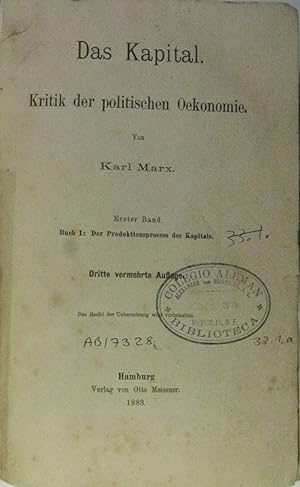
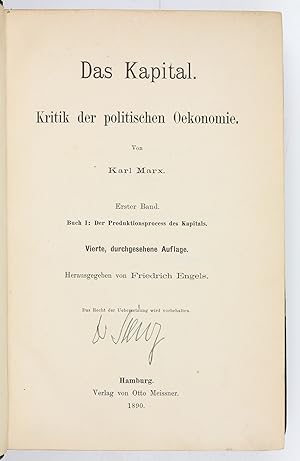
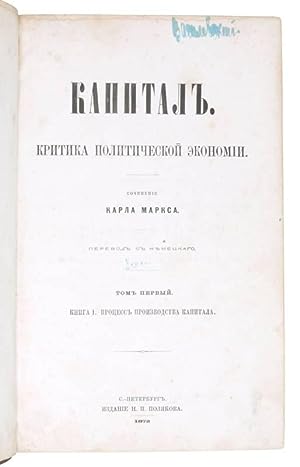
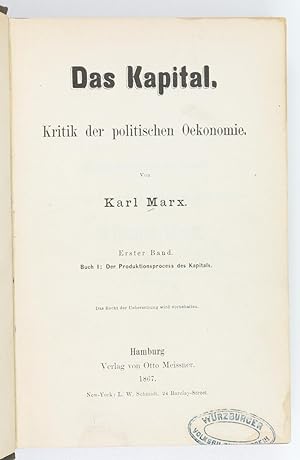


![Bild des Verkäufers für Zur Kritik der politischen Oekonomie. Erstes Heft [all that appeared]. - [THE BLUEPRINT FOR "DAS KAPITAL" - MAGNIFICENT ASSOCIATION-COPY] zum Verkauf von Lynge & Søn ILAB-ABF](https://pictures.abebooks.com/inventory/md/md30599586392.jpg)
![Bild des Verkäufers für Das Kapital. Kritik der politischen Oekonomie. Erster Band. Buch I: Der Produktionsprocess des Kapitals. - [THE NEW RELIGION - PMM 359] zum Verkauf von Lynge & Søn ILAB-ABF](https://pictures.abebooks.com/inventory/md/md30166156956.jpg)
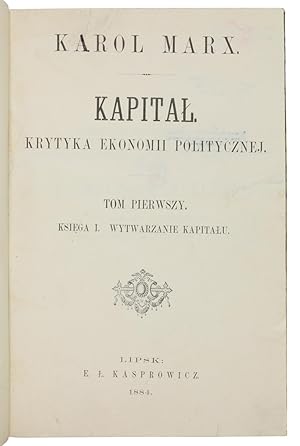

![Bild des Verkäufers für Das Kapital. A Collection Containing 4 First Editions of Karl Marx's Das Kapital (Bulgarian, Serbian, Serbo-Croatian, and Hebrew) [WITH] The Second Polish Edition zum Verkauf von ERIC CHAIM KLINE, BOOKSELLER (ABAA ILAB)](https://pictures.abebooks.com/inventory/md/md31203933505.jpg)

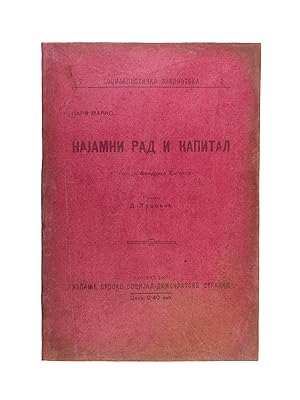
![Bild des Verkäufers für Kapitalen. 2 Dele. Første Bind. Kapitalens Produktionsproces. Oversat efter Originalens tredje Oplag. 2. Kapitalens Cirkulationsproces.Udgivet efter Forfatterens Død af Friedrich Engels. [i.e. Danish "Das Kapital"]. - [FIRST DANISH TRANSLATION OF "THE CAPITAL"] zum Verkauf von Lynge & Søn ILAB-ABF](https://pictures.abebooks.com/inventory/md/md22832888189.jpg)
![Bild des Verkäufers für Das Kapital. Kritik der politischen Oekonomie. Buch I: Der Produktionsprocess des Kapitals. Zweite verbesserte Auflage; [together with:] Buch II: Der Cirkulationsprocess des Kapitals. Herausgeben von Friedrich Engels; [and:] Buch III: Der Gesammtprocess der kapitalistischen Produktion. zum Verkauf von Peter Harrington. ABA/ ILAB.](https://pictures.abebooks.com/inventory/md/md31065736368.jpg)
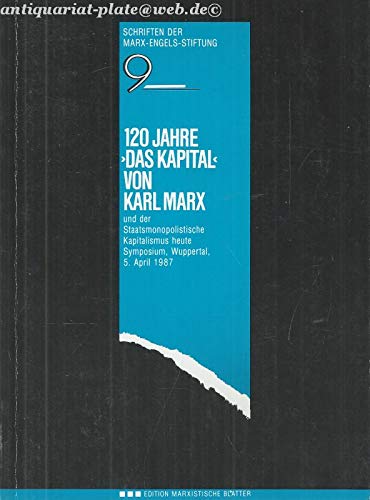
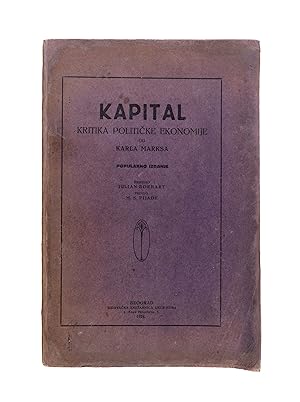

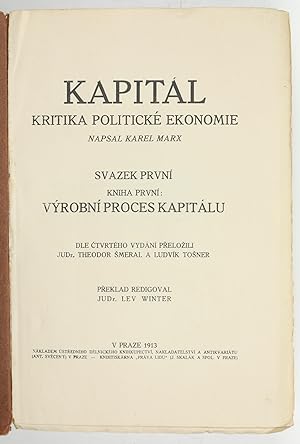
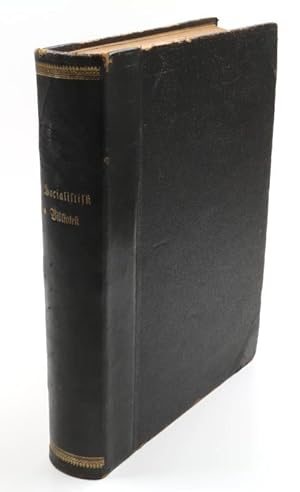
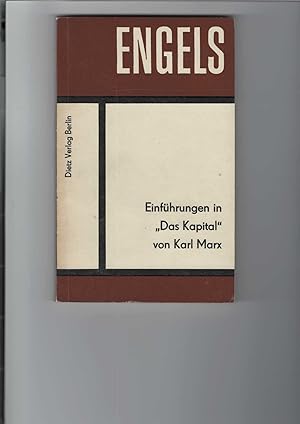
![Bild des Verkäufers für Kapital. Kritika politicheskoj ekonomii. Perevod c nmetskago. Tom pervoej. Kniga I. Protschess proizvodstva Kapitala. (Russian, = The Capital. Critique of the Political Economy. Translated from German. Volume One. Book I [all].). - [FIRST TRANSLATION INTO ANY LANGUAGE OF "THE BIBLE OF MARXISM"] zum Verkauf von Lynge & Søn ILAB-ABF](https://pictures.abebooks.com/inventory/md/md31430419122.jpg)
![Bild des Verkäufers für Das Kapital. Kritik der politischen Oekonomie. Dritter Band, zweiter Theil [First edition] zum Verkauf von Antikvariat Valentinska](https://pictures.abebooks.com/inventory/md/md31260427291.jpg)


![Bild des Verkäufers für Kapitalet. Kritik av den politiska ekonomin. I svensk oversättning av Rickard Sandler. 3 vols. - [FIRST SWEDISH EDITION OF MARX' "CAPITAL"] zum Verkauf von Lynge & Søn ILAB-ABF](https://pictures.abebooks.com/inventory/md/md30985434558.jpg)
